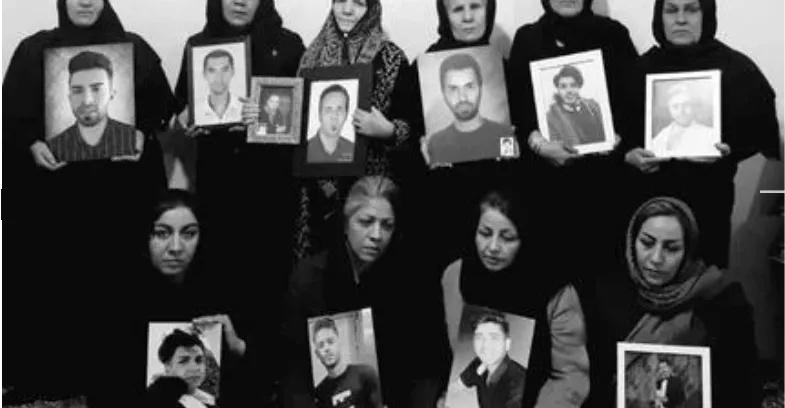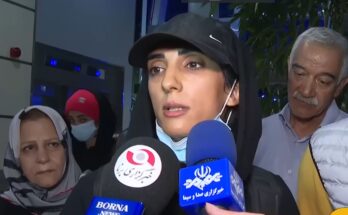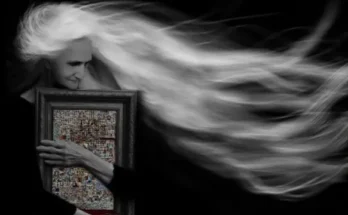Source: IranWire
By Aida Ghajar

As the mother of Ebrahim Ketabdar, killed in the November 2019 protests, Sakineh Mohammadi joins a long line of women who have transformed their grief into defiance.
She said, “Take us to prison, take us wherever you want – we are not afraid of you. You should be afraid of us.”
In just the past week, three mothers’ stories have highlighted the brutal cost of seeking justice in Iran.
In one cell, a mother lies beaten, fresh bruises marking her body – her only crime was asking questions about her child’s fate.
In the prison clinic, news arrives of another mother’s death. A stroke finally ended her years of standing outside these gates, sending desperate video messages, and demanding answers that never came.
And in a third cell, a mother who once stood outside these walls now finds herself behind them. Day by day, she attempts to end her life, seeing no other escape from a system designed to silence her.
They are just the latest in a decades-long chain of mothers who have faced the Islamic Republic’s repression.
Movement after movement, protest after protest, they have gathered – outside prison gates, in video messages, and increasingly, in prison cells.
Yet still, they come.
Still, they speak. Still, they demand answers about their children’s fates. As Sakineh Mohammadi understood, their grief itself has become a weapon the state cannot silence – not with prison bars, not with beatings, not even with death.
In the latest case of harassment against mothers, the beating of Saadat Bayazidi has been reported. On February 17, IRGC Intelligence forces attacked the home of political activist Farzin Tout in Piranshahr – who does not live in Iran himself – and beat his mother and grandmother.
Farzin’s mother had six teeth broken. His grandmother, who was also subjected to physical violence, is 80 years old.
Just one day before this news, the stroke of Rahimeh Khakizahi, mother of Ahmad Khakizahi, was reported.
On February 16, Intelligence Department forces in the Qasr-e Qand district of Sistan and Baluchistan violently arrested two Baluch citizens in front of their family members.
Ahmad’s mother, who was 52 years old, suffered a fatal stroke right there after witnessing the security forces’ violence against her son.
While the deaths of these two mothers may go unnoticed in the flood of daily news, Nahid Shirpisheh’s suicide attempt – the mother of Pouya Bakhtiari, killed in the November 2019 protests – highlights the deepening suffering of prisoners’ and victims’ families.
According to news posted by Mona, Pouya’s sister, Nahid Shirpisheh, who is imprisoned in Zanjan Prison for seeking justice for her son, attempted suicide.
In response, prison officials transferred her to solitary confinement, and her daughter wrote that she had no news of her mother for three weeks.
The deaths of justice-seeking mothers and prisoners’ mothers also bring back bitter memories from previous years.
Like the death of Arash Sadeghi’s mother, a human rights activist – when he came home on prison leave in 2011, security forces raided their house, and their violence caused his mother to suffer a fatal stroke.
Death has claimed the mothers of prisoners in other ways, too – like the mother of Amirreza Arefi, a former political prisoner, who died along with Amirreza’s wife in a car accident on the Ahvaz road in 2013 while returning home from visiting him.
On February 5, news came that Mehdi Mahmoudian, a journalist and human rights activist, was on his third day of a hunger strike.
It was later revealed that he had coughed up blood in the prison quarantine, and prison guards were forced to transfer him to the hospital.
The night before Mehdi Mahmoudian’s transfer to the hospital, his mother sat in front of the camera and cried out against the injustice.
“If my child comes home by tomorrow noon, so be it. I’m waiting for him here. If he doesn’t come, I will go there – arrest me too.”
The health problems of prisoners and their concerned mothers might remind one of Behnam Mahjoubi and his mother, Batoul Hosseini.
On February 21, 2021, Behnam died due to prison guards’ negligence in transferring him to the hospital in time.
Behnam had a “medical exemption from imprisonment” due to panic disorder. At that time, when Behnam’s body lay lifeless in the hospital, justice-seeking mothers from decades of Islamic Republic crimes gathered in Loghman Hospital’s yard and embraced Batoul Hosseini.
Two years after Behnam Mahjoubi’s death, when his mother was holding a memorial service for him, plainclothes security forces attacked Batoul Hosseini and Behnam’s sister, subjecting them to physical violence.
At that time, Batoul Hosseini released a video of herself saying, “If you think these actions will make me stop seeking justice for my child, you are gravely mistaken. I am a justice seeker.”
Perhaps mentioning Akram Neghabi as a symbol of mothers whose children disappeared under the Islamic Republic government brings the same question to mind for anyone following justice-seeking: “Where is Saeed Zeinali?”
Akram Neghabi has been seeking this answer since 1999, when her son was arrested during the University dormitory incident.
But the Islamic Republic has not only failed to answer this question – it has also arrested and interrogated Saeed Zeinali’s mother.
Saeed Zeinali’s mother and sister were arrested, threatened, and released on bail in 2010.
Another mother whose image holding a photo frame is etched in Iranians’ collective memory is Gohar Eshghi, the mother of Sattar Beheshti.
A suffering woman whose life changed in November 2012, Sattar Beheshti was a blogger who was killed under torture, and his mother was repeatedly subjected to violence.
Islamic Republic agents, who even forbid mourning for justice-seeking families, attacked their house during Sattar Beheshti’s 40th-day memorial service and beat his mother.
The history of justice-seeking mothers goes back further. During the 2009 protests and the rise of the Green Movement against election results, their numbers grew. These were mothers whose children were killed by Islamic Republic forces, either in protests or under torture.
A group of mothers who lost their children or spouses in the 2009 protests formed an organization after the killing of Neda Agha-Soltan in the Green Movement.
After holding protest gatherings seeking justice, at least 30 of them were arrested in January 2010 in Tehran’s Laleh Park.
During that arrest, one of the mothers was transferred to the hospital. Their goal, while protesting and keeping their children’s memory alive, was to prosecute those who ordered and carried out the state-sanctioned killing of their loved ones.
Ten years after the Green Movement, the nationwide November 2019 protests began, and more mothers were bereaved by their children’s blood.
During the 2022 protests, the fight for justice was carried on by other mothers who lost their children in the Woman, Life, Freedom movement or had loved ones imprisoned, as history seemed to repeat itself.




